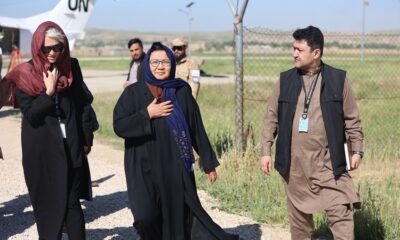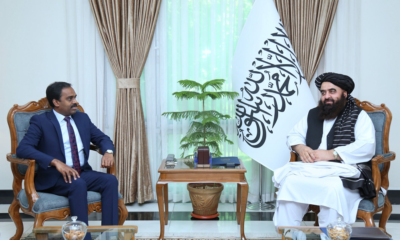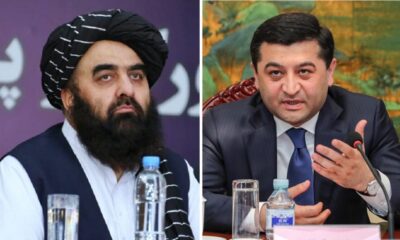Regional
Pakistan cracks down on Imran Khan’s supporters after violence
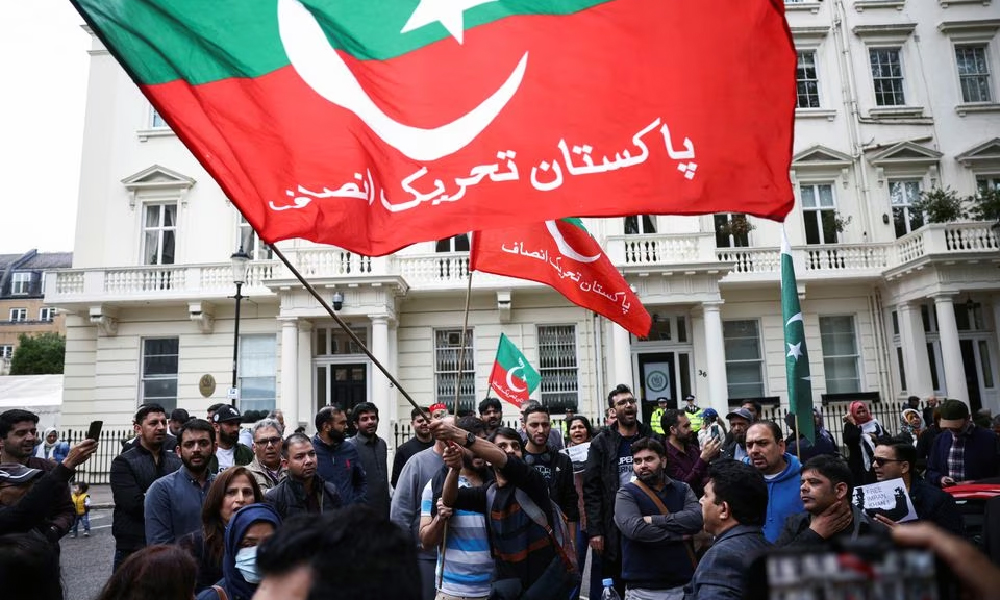
Police in Pakistan have arrested hundreds of supporters of ousted Prime Minister Imran Khan for violence after his arrest on corruption charges, authorities said on Wednesday, deepening a political crisis in the nuclear-armed country, Reuters reported.
Tuesday’s arrest of the former cricket hero, and Pakistan’s most popular politician according to opinion polls, came at a precarious time for the country that is facing a shortage of foreign exchange and a months-long delay of an IMF bailout.
Mobile data services were shut for a second day while Twitter, YouTube and Facebook were disrupted, as security forces tried to restore order after violence killed one person late on Tuesday.
The government said supporters of Khan’s Pakistan Tehreek-e-Insaf (PTI) party had attacked important state buildings and damaged private and public vehicles. Police said 945 of his supporters had been arrested in Punjab province after 25 police vehicles and more than 14 government buildings were set on fire, read the report.
“This can’t be tolerated, the law will take its course,” Planning Minister Ahsan Iqbal told a news conference. “These violent attacks were not the outcome of any public outpouring, they were planned by the PTI rank and file.”
Authorities in three of Pakistan’s four provinces have imposed an emergency order banning all gatherings after Khan’s supporters clashed with police.
Khan, 70, was arrested from the Islamabad High Court by Pakistan’s anti-corruption agency. Police said a court hearing would take place at the police guest house where he was being held in the Islamabad police lines area, Reuters reported.
PTI has called for supporters to gather in the capital and for a “shutdown” across the country of 220 million.
His arrest came a day after the powerful military rebuked him for repeatedly accusing a senior military officer of trying to engineer his assassination and the former armed forces chief of being behind his removal from power last year.
Pakistan’s Dawn newspaper said in an editorial that “the nature and locus of the protests that broke out following Mr Khan’s arrest yesterday signal that public anger is also directed at the military”.
Khan was due to appear for two hearings on Wednesday, Geo News reported, including for a corruption case related to property and another case that alleges Khan unlawfully sold state gifts during his 2018-22 tenure as premier. Khan has denied wrongdoing.
The Pakistani rupee fell 1.3% to a record-low of 288.5 against the U.S. dollar on Wednesday, while the 100-index of the Pakistan Stock Exchange dropped 0.7% in early trading before recouping its losses.
An International Monetary Fund bailout package for Pakistan has been delayed for months even though its foreign exchange reserves are barely enough to cover a month’s imports, Reuters reported.
PTI Vice Chairman Shah Mahmood Qureshi said the party’s senior leadership was in Islamabad to meet Khan and would approach the Supreme Court to challenge an Islamabad High Court order that deemed Khan’s arrest legal.
“We continue to call PTI family workers, supporters and the people of Pakistan onto the streets for peaceful protest against this unconstitutional behaviour,” Qureshi wrote on Twitter.
The protests have disrupted business in several cities. In Peshawar, chicken seller Malagul Khan said his shop and others were destroyed in the clashes, Reuters reported.
Raja Imran, 25, also a Peshawar resident, said, “There is total chaos across the country … There are exams going on and school children will suffer”.
Khan was ousted as prime minister in April 2022 in a parliamentary no-confidence vote. He has not slowed his campaign against the ouster even though he was wounded in a November attack on his convoy as he led a protest march to Islamabad calling for snap general elections.
The corruption case is one of more than 100 registered against Khan since his ouster after four years in power. In most of the cases, Khan faces being barred from holding public office if convicted, with a national election scheduled for November, read the report.
“Imran Khan will have to face the law and if he is cleared he will be contesting elections and if he is found guilty he will have to face the consequences,” Iqbal, the minister, said.
Regional
Panic in Pakistan as India vows to cut off water supply over Kashmir
Islamabad has denied any role and said “any attempt to stop or divert the flow of water belonging to Pakistan … will be considered as an Act of War”.
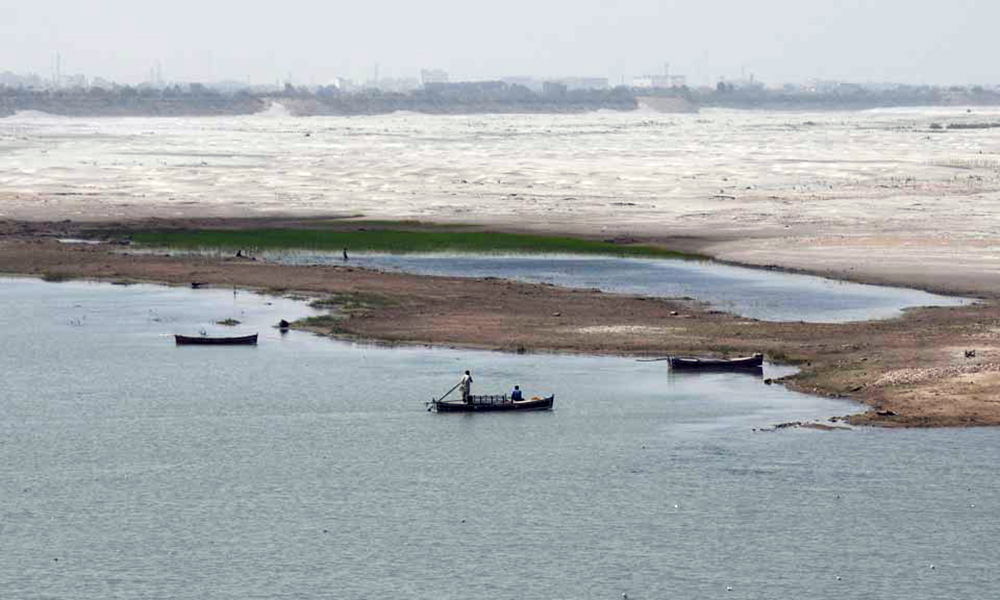
Pakistani farmers have voiced concern about future water supplies after India on Wednesday suspended the World Bank-mediated Indus Waters Tropy of 1960, which ensures water for 80% of Pakistan’s farms.
India said the suspension would last until “Pakistan credibly and irrevocably abjures its support for cross-border terrorism”.
This move comes after last week’s attack in Kashmir. India has accused Pakistan of having been involved, stating two of the three militants who attacked tourists and killed 26 men were from Pakistan.
Islamabad has denied any role and said “any attempt to stop or divert the flow of water belonging to Pakistan … will be considered as an Act of War”.
The treaty split the Indus and its tributaries between the nuclear-armed rivals.
Government officials and experts on both sides say India cannot stop water flows immediately, because the treaty has allowed it to only build hydropower plants without significant storage or dams on the three rivers allocated to Pakistan. But things could start changing in a few months, Reuters reported.
“We will ensure no drop of the Indus River’s water reaches Pakistan,” India’s water resources minister, Chandrakant Raghunath Paatil, said on X.
He did not respond to questions about the fears in Pakistan.
Two Indian government officials, who declined to be identified, said the country could within months start diverting the water for its own farms using canals while planning hydroelectric dams that could take four to seven years to finish.
Immediately, India will stop sharing data like hydrological flows at various sites of the rivers flowing through India, withhold flood warnings and skip annual meetings under the Permanent Indus Commission headed by one official each from the two countries, said Kushvinder Vohra, a recently retired head of India’s Central Water Commission.
“They will not have much information with them when the water is coming, how much is coming,” said Vohra, who was also India’s Indus Commissioner and now advises the government occasionally.
“Without the information, they cannot plan.”
And it is not just agriculture, a shortage of water will also hit electricity generation and potentially cripple the economy, economists say.
Vaqar Ahmed, economist and team lead with UK consulting firm Oxford Policy Management, said that Pakistan had underestimated the threat of India walking away from the treaty.
“India hasn’t got the kind of immediate infrastructure to halt the waterflows, especially during flood times, so this period creates a crucial window for Pakistan to address the inefficiencies in its water sector,” he said.
“There are a lot of inefficiencies, leakages.”
In recent years, Indian Prime Minister Narendra Modi’s government has been seeking to renegotiate the treaty and the two countries have been trying to settle some of their differences in the Permanent Court of Arbitration in the Hague over the size of the Kishenganga and Ratle hydroelectric plants’ water storage area, Reuters reported.
“We can now pursue our projects in free will,” said Vohra.
In a letter on Thursday, India told Pakistan that circumstances had changed since the treaty was signed, including population increases and the need for more cleaner energy sources, referring to hydropower.
Regional
Suspected chemical blast at Iran’s Bandar Abbas port kills at least 18, injures hundreds
President Masoud Pezeshkian ordered an investigation of the incident and sent to the site his interior minister, who said efforts were continuing to extinguish the fire and prevent it from spreading to other areas, read the report.
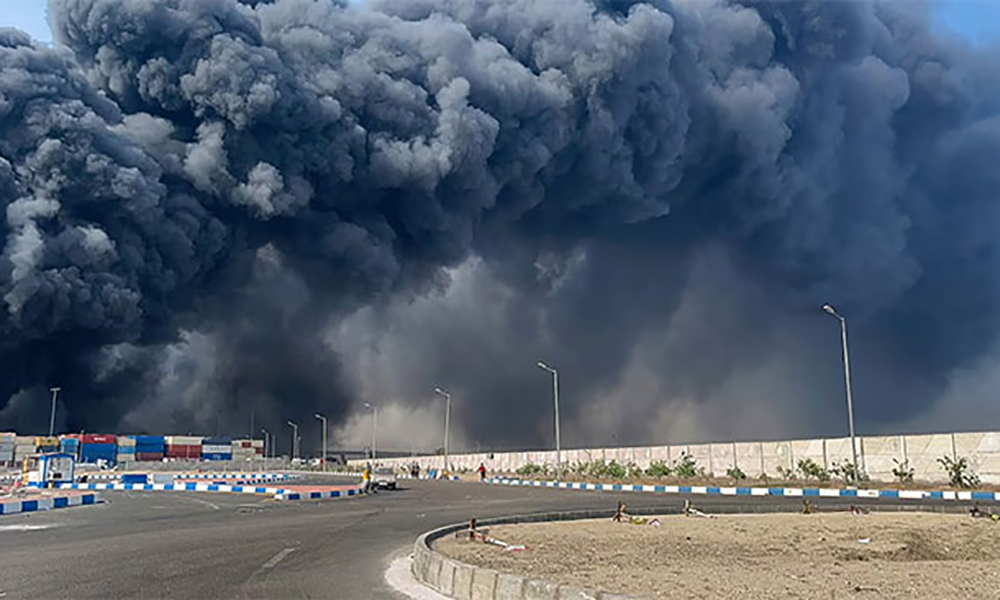
A huge blast probably caused by the explosion of chemical materials killed at least 18 people and injured more than 700 on Saturday at Iran’s biggest port, Bandar Abbas, Iranian state media reported.
The explosion, which hit the Shahid Rajaee section of the port, occurred as Iran began a third round of nuclear talks with the United States in Oman, but there was no indication of a link between the two events, Reuters reported.
Hossein Zafari, a spokesperson for Iran’s crisis management organisation, appeared to blame the explosion on poor storage of chemicals in containers at Shahid Rajaee.
“The cause of the explosion was the chemicals inside the containers,” he told Iran’s ILNA news agency.
“Previously, the Director General of Crisis Management had given warnings to this port during their visits and had pointed out the possibility of danger,” Zafari said.
However, an Iranian government spokesperson said that although chemicals had likely caused the blast, it was not yet possible to determine the exact reason.
President Masoud Pezeshkian ordered an investigation of the incident and sent to the site his interior minister, who said efforts were continuing to extinguish the fire and prevent it from spreading to other areas, read the report.
Iran’s official news channels aired footage of a vast black and orange cloud of smoke billowing up above the port in the aftermath of the blast, and an office building with its doors blown off and papers and debris strewn around.
Located near the strategic Strait of Hormoz, Shahid Rajaee port is Iran’s biggest container hub, handling a majority of the country’s container goods, according to state media.
The blast shattered windows within a radius of several kilometres and was heard in Qeshm, an island 26 kilometres (16 miles) south of the port, Iranian media said.
The semi-official Tasnim news agency posted footage of injured men lying on the road being tended to amid scenes of confusion.
State TV earlier reported that poor handling of flammable materials was a “contributing factor” to the explosion. A local crisis management official told state TV that the blast took place after several containers stored at the port exploded.
As relief workers tried to put out fires, the port’s customs officials said trucks were being evacuated from the area and that the container yard where the explosion occurred likely contained “dangerous goods and chemicals”. Activities at the port were halted after the blast, officials said.
A series of deadly incidents has hit Iranian energy and industrial infrastructure in recent years, with many, like Saturday’s blast, blamed on negligence.
They have included refinery fires, a gas explosion at a coal mine, and an emergency repair incident at Bandar Abbas that killed one worker in 2023.
Iran has blamed some other incidents on its arch-foe Israel, which has carried out attacks on Iranian soil targeting Iran’s nuclear programme in recent years and last year bombed the country’s air defences.
Tehran said Israel was behind a February 2024 attack on Iranian gas pipelines, while in 2020 computers at Shahid Rajaee were hit by a cyberattack. The Washington Post reported that Israel appeared to be behind that incident as retaliation for an earlier Iranian cyberattack, Reuters reported.
Israel has indicated it is nervous about the outcome of U.S.-Iran talks, demanding a full dismantlement of Iran’s nuclear programme. Tehran says the programme is used solely for peaceful purposes, while international observers say it is getting closer to being able to build a bomb.
There was no immediate comment from Israel’s military or Prime Minister Benjamin Netanyahu’s office when asked for comment on whether Israel was in any way involved in Saturday’s explosion.
Oil facilities were not affected by the blast on Saturday, Iranian authorities said.
The National Iranian Petroleum Refining and Distribution Company said in a statement it had “no connection to refineries, fuel tanks, distribution complexes and oil pipelines.”
Regional
At least 47 injured after explosion at port in Iran’s Bandar Abbas
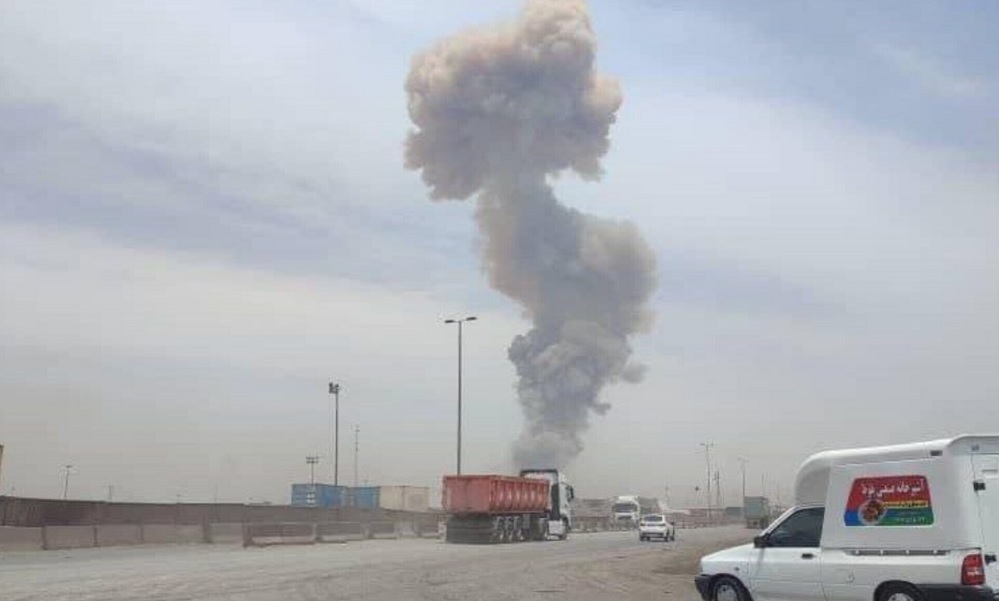
A large explosion rocked Shahid Rajaee port in the southern Iranian city of Bandar Abbas on Saturday, with at least 47 people injured after the blast, state media reported.
The blast occurred as Iran began a third round of nuclear talks with the United States in Oman, although the cause of the explosion was not immediately clear, Reuters reported.
“The cause of this incident was the explosion of several containers stored in the Shahid Rajaee Port wharf area. We are currently evacuating and transferring the injured to medical centres,” a local crisis management official told state TV.
Fars news agency reported that 47 people were injured according to initial estimates.
Semi-official Tasnim news agency added that the port’s activities were suspended to extinguish the fire and that considering the large number of port employees “many people were probably injured or even killed in the incident.”
The blast shattered windows within a radius of several kilometres, Iranian media said, with footage shared online showing a mushroom cloud forming following the explosion.
In 2020, computers at the same port were hit by a cyberattack that caused massive backups on waterways and roads leading to the facility. The Washington Post had reported that Iran’s arch-foe Israel appeared to be behind that incident as retaliation for an earlier Iranian cyberattack.
-

 Sport4 days ago
Sport4 days agoSri Lanka A defeats Afghanistan A by 4 wickets in Abu Dhabi
-

 Business5 days ago
Business5 days agoAfghanistan’s growth prospects remain uncertain amid global uncertainty: World Bank report
-

 World5 days ago
World5 days agoUkraine ready to hold talks with Russia once ceasefire in place, Zelenskiy says
-

 Latest News4 days ago
Latest News4 days agoAWCC activates new site in Nangarhar’s Kuz Kunar district
-

 Latest News4 days ago
Latest News4 days agoTarig Ali Bakheet and Japan’s Deputy Foreign Minister discuss Afghanistan’s situation
-

 Climate Change5 days ago
Climate Change5 days agoPowerful earthquake of 6.2 magnitude shakes Istanbul
-

 Business4 days ago
Business4 days agoPakistan’s deputy PM discusses Trans-Afghan Railway Line project with Uzbek FM
-

 Latest News5 days ago
Latest News5 days agoSpecial meeting will be held to launch Afghanistan–Russia joint commission, says Kabulov


